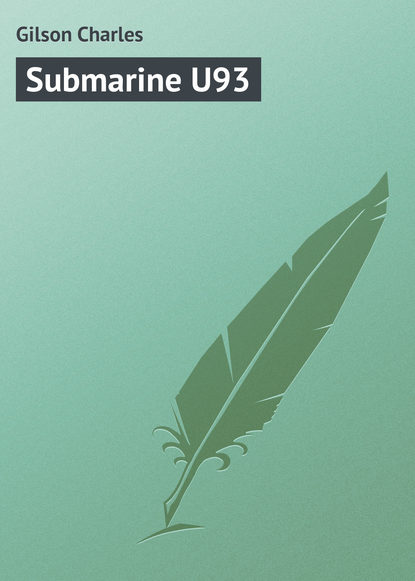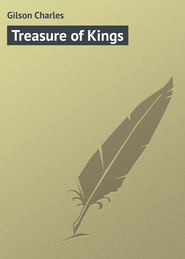По всем вопросам обращайтесь на: info@litportal.ru
(©) 2003-2025.
✖
Submarine U93
Настройки чтения
Размер шрифта
Высота строк
Поля
Afterwards, Jimmy remembered the man's words quite well, just as clearly as one often remembers on waking one's last thoughts before falling asleep.
"You defy me!" he muttered. "You'll not live to do it again."
At that, he raised his right hand, in which was something like a bar of iron, and Jimmy Burke remembered nothing more; the conscious part of him vanished, as in a flash, and left him in a weird world of darkness, nothingness and silence.
When he came to his senses, he was in bed; Aunt Marion was bending over him, and Peggy was near at hand. There were bandages about his head. Also, something was the matter with his eyes; for, before he could remember where he was, or who Peggy and Aunt Marion were, his eyes began to ache, and he was obliged to close them.
According to the doctor, it was a miracle that Jimmy had escaped with his life. He had been dealt a shattering blow with some blunt instrument; he had not been found for three hours, when he was picked up by a labouring man on his way to his work in the small hours of the morning. Since there was no hospital near at hand this man had carried the unconscious boy to his own address which he had found in a note-book in the pocket of Jimmy's coat.
Peggy had immediately hastened for a doctor; and the police were informed of the identity of Rudolf Stork. For days Jimmy was delirious; and had it not been for good nursing, he could never have pulled through.
Those critical days, when the boy's life was in danger and his mind adrift, were followed by weeks of convalescence. And finally, when he was quite well again, he was so reduced in strength that it was altogether out of the question that he should think of returning to work.
And when he did try to go back to his former employment at the docks, he found that his place had been filled by another. Since the outbreak of the war, trade had been on the ebb, and work was harder than ever to find.
There followed another period of enforced idleness. And it was now winter; and grey, sunless skies, bitter winds, and constant rain and sleet, have, at the best of times, a sombre effect upon the spirits.
The boy became utterly depressed. He felt that he had no right to go on living with Aunt Marion and Peggy, though both repeatedly assured him that there was no need for him to worry. He felt that he was approaching manhood, and it was a man's duty to work. This inactivity was all the harder to bear, because the Great War was still raging with unabated fury.
At last, one evening, as he was wending his way home through Central Park, after another unsuccessful day, he decided to take his destiny into his own hands, to take a plunge into the future, which might be fortunate or fatal, but which in any case would be decisive.
He knew quite well that what he proposed to do was wrong. He had often prayed to God for help, but that night he prayed to be forgiven.
That evening he opened a small box of tools which his father had given him years ago, and taking out a steel file, set to work on "Swiftsure Burke's" lucky sixpence, which he deliberately filed in half.
That took him the best part of half an hour; and it was almost as great a business to punch a hole through each separate half. He was not quite sure where he had heard of the old, time-worn superstition of dividing a lucky sixpence. Perhaps his father and mother had done something of the kind, in the days when they were young.
He wrapped up a few of his most necessary belongings in a towel; and when he had done that he went downstairs and found Peggy in the sitting-room. Aunt Marion had gone to bed.
"Peggy," said he, "I'm going away."
"Going away!" she repeated. "Where?"
"I'm going right away. I can't stay here idle any longer. I'm going to try to do my duty."
She came towards him, and a little nervously laid a hand upon his arm.
"Jimmy," she said, "you're not serious, are you?"
It took him quite a long time to convince her that he was really in earnest; then, without another word, she gave him what he asked for-a bottle of water and a loaf of bread. This he put into his bundle; and then it was that he produced the two halves of the dented, lucky sixpence, which had saved the life of the Admiral.
What he had to say he said altogether clumsily, and even blushed as he said it. He explained that he wanted to give her something by which she would always remember him, and he thought half his lucky sixpence might meet the case; indeed, it was all he had. Before he had finished speaking there were tears in Peggy's eyes.
She did not endeavour to dissuade him from going. But she told him that Aunt Marion would never forget it, if he went away without seeing her. Jimmy, however, felt that he had not sufficient moral courage to resist further persuasions, and in this case it was kinder to be cruel.
It was very late when he let himself out, and set off walking rapidly in the direction of the docks. Peggy did not sleep that night; hour after hour, she lay awake, her pillow wetted with tears, gripping tightly in her hand her half of the Admiral's sixpence.
Jimmy knew his way about New York harbour. He knew where the ships were moored, and how to elude the night-watchmen and the dockyard police. He had tried, time and again, to work his way to England, as a cabin boy or a steerage hand, and had failed. There was no other way but this.
Stealthily, he made his way along the wharves, creeping in and out among bales and boxes of cargo. A large tramp steamer, the "Harlech," which belonged to Jason, Stileman and May, was under steam, bound for Portsmouth, due to sail some time the following day.
From behind a great crane, similar to that at which he himself had once been wont to work, Jimmy took stock of the "Harlech." Her after-gangway was lowered, a lantern suspended at the top. The night-watchman patrolled the main deck, pausing now and again to relight his pipe. Presently, the man went forward to the forecastle; and Jimmy seizing his opportunity, slipped up the gangway, crossed the after-well deck, and tumbled down the hatch.
It was a sheer drop of ten feet at least. Luckily for the boy, he fell upon soft bags of oats. Scrambling to his feet, he passed onward, stumbling repeatedly, for the hold was so dark he could not see a yard before him.
More by good luck than by good management, he came upon the lower hatchway, which connected with the hold beneath. Lowering himself with the utmost care, he found a firm footing upon a great pile of boxes; and passing over these, he found a place where he could sit down and where there was little chance that he would be discovered. There, he waited nearly twenty-four hours, during which time he had nothing to eat but his loaf of bread, whilst he ran a great risk of his presence being detected, for the time of sailing was put off until late on the following night.
There were rats in the hold, but he did not mind them in the least. All that he cared about was that he should remain undiscovered until the ship was well out at sea. He had no wish to be put ashore at Cape Race or Halifax.
Soon after sunrise, he heard the feet of men moving on the deck above, and this continued throughout the day, whilst the winches rattled and groaned. Fortunately for him, they were working on the forward holds, and though the after-hatches were still open, there was apparently no more cargo for that part of the ship. All this time the engines were throbbing violently. There was a kind of continuous vibration throughout the length and breadth of the ship which continued far into the night. It must have been almost ten o'clock, when suddenly a voice rang out-the voice of a man whom Jimmy was destined to know, whom he was to learn to honour and admire. It was the voice of Captain Crouch.
"Mr. Dawes," came the voice, "all hands aboard?"
"All aboard, sir."
"Then man the windlass, and let her go. We're mighty late as it is."
A moment later, Jimmy heard the bell ring in the engine-room and the "Harlech" was under way.
She steamed slowly out of New York harbour, passing Liberty Island and the forts. Jimmy-though he could see nothing but the outline of great packing-cases and boxes, dimly visible in the half-light that crept down through the open hatchway-pictured in his imagination the great sky-scrapers around Wall Street, and the towering buildings in Madison Square, fading gradually out of sight in the bright moonshine that flooded New York harbour.
From time to time, the bell rang in the engine-room; and then, the "Harlech" slowed down to drop the pilot. And Jimmy Burke knew that he, too, had dropped the pilot on the long voyage of life.
His heart was beating rapidly in excitement and vague anticipation. The Past had not been altogether happy. The Future was in the clouds.
And then, once again, came the voice of Captain Crouch.
"Mr. Dawes, close that after-hatch."
Jimmy heard the men at work under the boatswain on the deck above; and then, all was utter darkness and silence. The hatch had been battened down.
A little after, the "Harlech" took on a roll, as she struck the broad Atlantic, and took up her course for the Fastnet on the south coast of Ireland, nearly three thousand miles away. The grandson of "Swiftsure Burke" was bound for the shores of the Motherland which he could only just remember, and the Great War that thundered in the East.
CHAPTER VI-Captain Crouch
At about ten o'clock in the morning of the day the "Harlech" sailed, whilst Jimmy Burke lay in hiding in the hold among the packing-cases and boxes of cargo, Captain Crouch was ushered into the offices of Jason, Stileman and May.
Now, those who know nothing of Captain Crouch are unacquainted with one of the most singular personalities it were possible to imagine. He knew the world as few men know it, from Yokohama to Valparaiso, from Hudson Bay to Hobart. Indeed, his strange and varied experiences would fill a book, which could certainly never be published at less than a guinea net.
As a boy, he had sold newspapers in the crowded streets of London. From that he had risen to command a merchant ship. He had been shipwrecked time and again. He had been shot in the right eye with a poisoned arrow, somewhere at the back-of-beyond on the West Coast of Africa, which is called "The White Man's Grave." He had had a foot bitten off by a shark in the Bay of Fernando Po. And yet, in spite of his cork foot and his glass eye, he was more than a match for most men. Though he was not much more than five feet four in height, he was as wiry as a ferret, and as quick in all his movements. He feared no man, and was a rifle and revolver shot who seldom missed his mark. He had a threefold reputation: he was one of the most intrepid explorers in the world; he had shot tigers in the Sunderbunds and rogue-elephants in the forests of the Congo. As a master mariner, he had sailed the seven seas for the greater part of his life, was a skilful navigator, and one who could keep his head in an emergency.
Such a man was Crouch. Those who have read of his doings elsewhere know that, on a former occasion, he penetrated to the reaches of the Hidden River, in the unexplored valley of the Kasai, and there unearthed both a modern slave-trader and a ruby mine. It was also Captain Crouch who ventured into the trackless region of the Aruwimi, in search of Edward Harden, the lost explorer, of whom nothing had been heard for four years; and how he succeeded in his quest, and all the adventures that befell him, have been written of elsewhere.
In fact, Crouch was a man to whom adventure was as the very breath of his nostrils; the spirit of adventure flowed in the blood of his veins. He sought perilous enterprises because his idea of life was danger, because he understood that in this world the main duty of man was to accomplish. And Crouch accomplished much. He was one of the pioneers of civilization, one of those who go before the flag that trade is said to follow. He was as much out of his element in a comfortable armchair before a winter's fireside, as a backwoodsman in a boudoir. He belonged to the life of the open air, of the free and rolling sea. Indeed, it may even be said that his little, shrunk and wizened figure was a kind of stormy petrel: his very presence was a certain signal that danger and adventure were at hand.
And thus, it is hardly likely, on the face of things, that at the outbreak of the Great War such a man would remain idle for long. Even had he not sought employment of his own free will, there were those who knew of him by reputation, who were only too eager to enlist his services.
He had been found in London, at the Explorers' Club in Bond Street, which is a great place of a winter's evening, where you may hear tales which are as wonderful as they are true. He had been asked to leave at once for New York, on a certain dangerous mission. He had been given five minutes in which to make up his mind; and that was exactly four minutes and fifty-nine seconds longer than he required.









